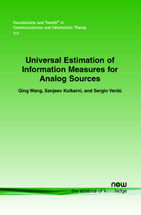Universal Estimation of Information Measures for Analog Sources
By Qing Wang, Credit Suisse Group, USA, qingwang@Princeton.edu | Sanjeev R. Kulkarni, Department of Electrical Engineering, Princeton University, USA, Kulkarni@Princeton.edu | Sergio Verdú, Department of Electrical Engineering, Princeton University, USA, Verdu@Princeton.edu
Abstract
This monograph presents an overview of universal estimation of information measures for continuous-alphabet sources. Special attention is given to the estimation of mutual information and divergence based on independent and identically distributed (i.i.d.) data. Plug-in methods, partitioning-based algorithms, nearest-neighbor algorithms as well as other approaches are reviewed, with particular focus on consistency, speed of convergence and experimental performance.
Universal Estimation of Information Measures for Analog Sources
Entropy, mutual information and divergence measure the randomness, dependence and dissimilarity, respectively, of random objects. In addition to their prominent role in information theory, they have found numerous applications, among others, in probability theory statistics, physics, chemistry, molecular biology, ecology, bioinformatics, neuroscience, machine learning, linguistics, and finance. Many of these applications require a universal estimate of information measures which does not assume knowledge of the statistical properties of the observed data. Over the past few decades, several nonparametric algorithms have been proposed to estimate information measures.
Universal Estimation of Information Measures for Analog Sources presents a comprehensive survey of universal estimation of information measures for memoryless analog (real-valued or real vector-valued) sources with an emphasis on the estimation of mutual information and divergence and their applications. The book reviews the consistency of the universal algorithms and the corresponding sufficient conditions as well as their speed of convergence.
Universal Estimation of Information Measures for Analog Sources provides a comprehensive review of an increasingly important topic in Information Theory. It will be of interest to students, practitioners and researchers working in Information Theory
